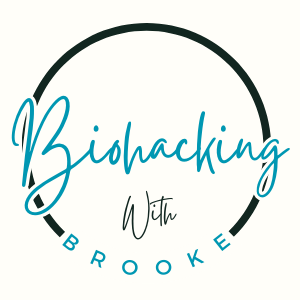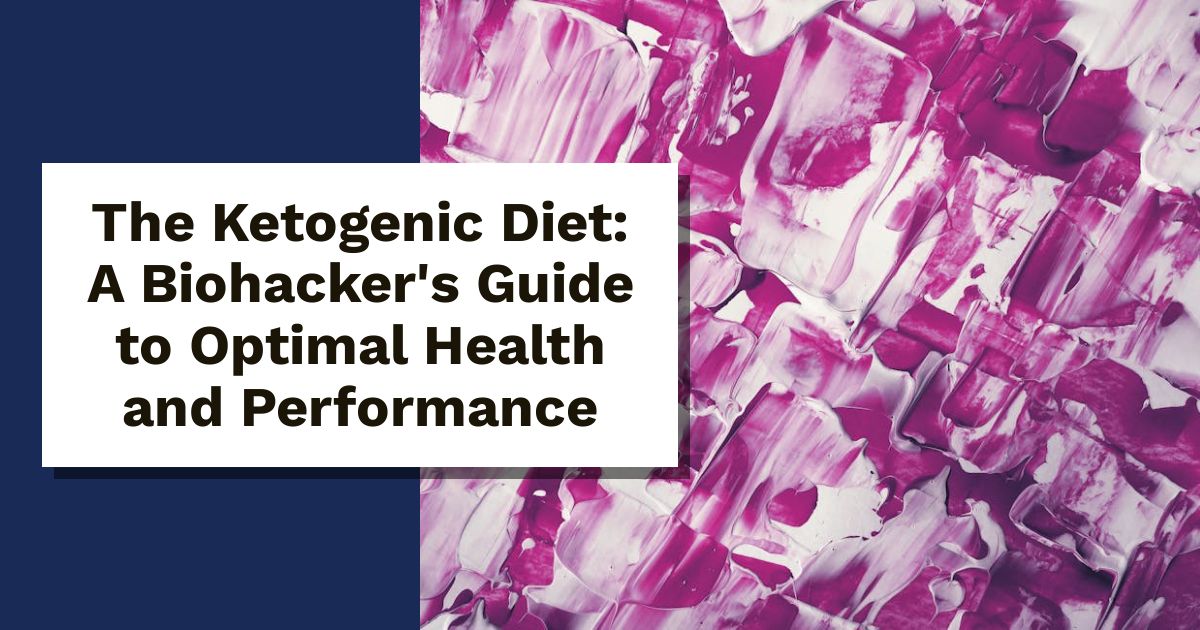The ketogenic diet has become a hot topic for biohackers seeking to maximize their health and performance. But what makes this low-carb, high-fat approach so appealing?
Picture this: rapid fat loss, sharper mental focus, and steady energy levels throughout the day. For many, it’s a game of optimization—finding what works best for their bodies.
In this post, we’ll dive into the basics of the ketogenic diet and how it aligns with biohacking principles. You’ll discover practical tips to enhance your health journey, from meal planning to tailoring it to your lifestyle.
Are you ready to transform your energy and cognitive function? Let’s get started!
What is the Ketogenic Diet?
The ketogenic diet, often called keto, is a low-carb, high-fat eating plan. It aims to shift your body’s metabolism from burning glucose (sugar from carbs) to burning fat. Imagine your body as a hybrid car—when carbs are minimal, you switch to fat for fuel. This metabolic shift can lead to rapid fat loss, more stable energy, and improved mental clarity.
Basic Principles
When you eat fewer carbohydrates, your body enters a state called ketosis. In ketosis, the liver converts fat into ketones, which serve as an alternative energy source. Think of it like changing from gasoline to electricity; your body operates differently.
To reach ketosis, most people aim for a diet that includes:
- Fewer than 20-50 grams of carbs per day.
- Moderate protein intake. Too much protein can kick you out of ketosis.
- High fat intake to make up the difference in calories.
This shift not only supports weight loss but can also enhance cognitive functions. Imagine having clearer thoughts and a sharper focus throughout your day!
For a deeper understanding of the ketogenic diet, check out this beginner’s guide.
The Macronutrient Breakdown
In a standard ketogenic diet, the macronutrient ratios are quite distinct compared to traditional diets. Most people follow a breakdown similar to this:
- 70-80% fat: This is the primary fuel source. Think oils, nuts, and avocados.
- 10-20% protein: Essential for muscle repair but keep it moderate.
- 5-10% carbohydrates: Yes, it’s a tiny amount! Focus on low-carb veggies and whole foods.
Here’s how this typically translates into a day’s worth of eating for a 2,000-calorie diet:
- Fat: About 155-178 grams
- Protein: Around 50-100 grams
- Carbohydrates: Only about 25-50 grams
This precise balance is essential for entering and staying in ketosis. It’s all about manipulating your body’s fuel sources. For more detailed information on macronutrient distribution on keto, check out this diet review.
Having this knowledge empowers you to make informed choices. Tailoring your food intake can be a fun challenge on your road to optimizing health and performance as a biohacker. Are you ready to see how keto can transform your energy and focus?
Benefits of the Ketogenic Diet for Biohackers
Biohackers are always on the lookout for methods that provide better health, sharper focus, and more energy. The ketogenic diet isn’t just a trendy eating plan; it offers unique benefits that align seamlessly with biohacking goals. Let’s explore how keto can help you optimize your mental performance and energy levels while promoting sustainable weight management.
Enhanced Mental Focus
When you’re in ketosis, your body converts fat into ketones, which become your brain’s primary energy source. This shift has been shown to boost cognitive function and mental clarity. Many biohackers report improved focus and memory when following a ketogenic diet. Imagine your brain running on premium fuel!
- Stable Energy: Unlike glucose, ketones provide a steady flow of energy. This keeps your mind sharp all day without the dreaded sugar crashes.
- Reduced Brain Fog: Many individuals notice a significant decrease in brain fog, leading to clearer thinking and quicker problem-solving.
For a deeper look at the cognitive benefits of keto, check out this article on cognitive performance.
Improved Energy Levels
Are you tired of energy dips throughout the day? The ketogenic diet can help you maintain stable energy levels, ideal for busy biohackers. Instead of relying on quick carbs, your body taps into fat stores, which results in longer-lasting energy.
- No More Energy Rollercoaster: Shifting to fat for fuel means fewer spikes and drops in energy. You can power through that afternoon slump without reaching for snacks.
- Sustained Activity: Stable energy supports sustained physical activity, enabling you to stay active and engaged.
Learn more about how keto fuels energy in this biohacking strategies article.
Weight Loss and Fat Adaptation
The ketogenic diet is well-known for aiding in weight loss, and for good reason. It promotes a state called fat adaptation, where your body becomes efficient at burning fat for fuel.
- Sustainable Weight Loss: Many people find they shed pounds more effectively on keto. This isn’t just a quick fix; it encourages healthy long-term habits.
- Less Hunger: Eating high-fat foods can increase satiety, meaning you don’t feel hungry as often. This can prevent overeating and help maintain a healthy weight.
For more on how keto impacts weight loss, check out this detailed review.
Embracing the ketogenic diet can unlock numerous benefits for biohackers. From enhanced mental clarity to improved energy and effective weight management, keto offers a wide range of advantages that can help you achieve your personal health goals.
Getting Started with the Ketogenic Diet
The ketogenic diet opens up a world of possibilities for biohackers eager to optimize their health. However, getting started may feel overwhelming at first. Let’s simplify the process with some practical strategies to ease into this low-carb, high-fat lifestyle.
Meal Planning Tips
Meal planning is crucial for staying on track with keto. You want to be prepared to fend off temptation and stick to your goals. Here are some easy meal ideas and snack options that fit the keto profile:
- Breakfast:
- Eggs cooked in butter or olive oil.
- Greek yogurt topped with nuts and seeds.
- Avocado with a sprinkle of salt and pepper.
- Lunch:
- Spinach salad with grilled chicken, olive oil, and avocado.
- Lettuce wraps filled with turkey and cheese.
- Cauliflower rice stir-fried with veggies and your choice of protein.
- Dinner:
- Zucchini noodles with pesto and shrimp.
- Baked salmon with asparagus and a side of mashed cauliflower.
- Beef stir-fry with low-carb vegetables.
- Snacks:
- Cheese sticks or slices.
- Hard-boiled eggs.
- Nuts or seeds (but watch those portions!).
Plan your meals each week to avoid the last-minute scramble. For more detailed planning, check out this 7-Day Keto-Friendly Meal Plan.
Understanding Keto Flu
As with any diet, the ketogenic diet has its quirks, including the infamous “keto flu.” This temporary condition can hit when your body adjusts to low carb intake. Symptoms might include fatigue, headaches, irritability, and muscle cramps. It’s like your body is throwing a little tantrum as it learns to shift gears.
Managing keto flu effectively is key to a smoother transition. Here are some strategies:
- Stay Hydrated: Drink plenty of water to help minimize symptoms.
- Replenish Electrolytes: Add salt to your food or go for electrolyte drinks.
- Gradual Transition: Instead of jumping straight into strict keto, try reducing carbs slowly.
- Rest Up: Ensure you are getting enough sleep to support your body’s adjustment.
For more tips on handling keto flu, read this article on remedies for keto flu.
Tracking Your Progress
Tracking your macros is essential for success on keto. It helps you stay accountable and adjust your diet as needed. Fortunately, numerous tools and apps can make this easier. Here are some top picks:
- Carb Manager: This app allows you to track your net carbs, calories, and activities. It’s user-friendly and includes barcode scanning for easy logging. Check it out here.
- Cronometer: Great for those who want to dive into the nutritional details of their food. It tracks vitamins and minerals as well. More info here.
- Senza: A beginner-friendly option that helps you navigate the keto diet with ease. Discover more here.
- MyFitnessPal: A versatile app that can be tailored for keto tracking. It’s well-known and widely used.
By using these tools, you can simplify your journey and make adjustments based on what works best for you. Start tracking today to turn your keto goals into reality!
Common Myths and Misconceptions
The ketogenic diet has attracted its fair share of myths and misconceptions. Clearing these misunderstandings is crucial for anyone considering adopting keto as part of their biohacking journey. Let’s tackle some common falsehoods that can cloud your understanding and impede your progress.
Keto is Just a Fad Diet
One of the biggest misconceptions is that keto is simply a fad diet. The truth is, the ketogenic diet has origins dating back to the 1920s. Physicians used it to treat epilepsy, especially in children who didn’t respond to medications. It’s evolved over the years and now garners interest for its weight-loss benefits, cognitive enhancement, and metabolic health.
Keto isn’t a temporary fix. Many find lasting success by adopting it as a lifestyle. While trends fade, keto has proven itself in scientific studies and anecdotal evidence alike. It stands the test of time, much like a classic song that never goes out of style. To read more about myths surrounding keto, check out this detailed breakdown.
Carbs Are Bad
Another widespread myth is that all carbohydrates are bad. This simply isn’t true. Carbohydrates come in two forms: healthy and unhealthy.
- Healthy Carbs: These are whole foods rich in fiber, vitamins, and minerals. Think fruits, veggies, whole grains, and legumes. They’re packed with nutrients and can be part of a balanced diet.
- Unhealthy Carbs: Refined carbs like sugary snacks, white bread, and pastries provide little nutritional value. They can spike your blood sugar and lead to energy crashes.
Understanding this distinction is crucial. Not all carbs should be avoided on a ketogenic diet, but choosing the right ones matters. For a deeper insight, read this helpful article on the difference between good and bad carbs.
Remember, moderation is key. It’s not about vilifying carbs but making informed choices that support your health and biohacking goals.
Challenges and Considerations
Adopting the ketogenic diet can come with its own set of challenges. Understanding these hurdles can help you navigate your journey and maintain your commitment to a healthier lifestyle. Here are some considerations that biohackers should keep in mind.
Social Situations
Social settings can often be a minefield for those on keto. Navigating gatherings while sticking to your dietary choices can be tricky. Here are strategies to stay keto-friendly:
- Communicate: Let your friends and family know about your dietary preferences ahead of time. This sets expectations and allows them to support you.
- Plan Your Plate: Check the menu in advance if dining out. Choose restaurants with low-carb options and don’t hesitate to ask for modifications.
- Bring Your Own Dish: If it’s a potluck or informal gathering, prepare a keto-friendly dish to share. This guarantees you have something to eat and introduces others to delicious keto foods.
- Snack Smart: Before heading to a social event, eat a small keto-friendly snack. This can curb your hunger and reduce temptation.
While it may feel daunting, many find that their social circle adjusts over time. You can read about effective approaches to manage social life on keto here.
Long-term Sustainability
How sustainable is the ketogenic diet in the long run? That’s a crucial question for anyone considering this lifestyle. Here are some insights:
- Adaptability: While many enjoy the keto lifestyle, others might find it difficult to maintain. It may feel rigid and limit food choices, causing frustration over time.
- Nutritional Balance: Some worry about missing out on essential nutrients. Without careful planning, low-carb eating can restrict fruits, vegetables, and whole grains, leading to deficiencies.
- Social Isolation: Sticking strictly to keto can sometimes create distance from friends and family, especially during shared mealtimes. Balancing your diet choices with social obligations is vital.
For a deeper understanding of long-term sustainability, see this Harvard Health article.
Keeping these challenges in mind can help prepare you for the highs and lows of the ketogenic diet. With the right strategies, you can enjoy a fulfilling keto lifestyle while making it fit your social and personal life.
Success Stories from Biohackers
The ketogenic diet has transformed many lives, offering biohackers a way to optimize health and performance. Here are some real-life transformations and lessons learned from those who have adopted this lifestyle.
Real-Life Transformations
Individuals embracing the ketogenic diet have shared remarkable stories. One standout example is Alison Gannett, a brain cancer survivor who made keto a fundamental part of her healing journey. She transformed her health and now shares her success through various platforms. Hear her inspiring story in this podcast episode.
Another incredible transformation comes from Ally, who lost 120 pounds in just 15 months on the keto plan. She describes keto as the best decision she made for herself, shedding not only weight but also years of frustration. Read her full story here.
Countless testimonials similar to these highlight the powerful impact of the ketogenic diet. People have reported not only weight loss but also enhanced mental clarity and sustained energy levels. Curious about more experiences? Check this article detailing various biohacking journeys here.
Lessons Learned
Every biohacker’s journey is unique, but common lessons emerge. Many have discovered the value of patience. The body requires time to adapt to a ketogenic lifestyle. Rapid changes can lead to frustration, similar to trying to sprint before learning to walk.
Another key takeaway is the importance of community support. Engaging with fellow keto enthusiasts creates a sense of accountability. Sharing progress, recipes, and suggestions can be motivating.
Finally, tracking is crucial. Many biohackers emphasize the need to monitor macronutrients carefully. By understanding their bodies’ responses to different foods, they can make informed adjustments. This empowers their personal health journeys significantly.
The experiences of those thriving on keto highlight the benefits of commitment and adaptability. By sharing their stories, they inspire others to embark on their journeys toward optimized health through biohacking.
Conclusion
The ketogenic diet offers biohackers exciting opportunities for improved health and performance. With benefits like enhanced mental focus, stable energy, and effective weight management, it’s a compelling option.
However, challenges like social situations and long-term sustainability require careful consideration.
Experiment wisely, track your progress, and connect with a supportive community. The ketogenic journey can lead to notable transformations, but it’s essential to stay informed and adaptable.
Are you ready to try keto for yourself? Share your thoughts and experiences, and let’s keep this conversation going!
Brooke is a rock-climbing 🧗♀️, tennis-playing 🎾, biohacking 🧬 bookworm 📚 on a mission to unlock the secrets of health, longevity, and living life to the fullest 🌟. When she’s not scaling cliffs, hitting the courts, or testing out the latest hacks, you’ll find her nose in a book or adventuring with her four-legged best friend 🐕 by her side. With a knack for turning science into simple, actionable tips, Brooke’s writing is your guide to hacking your biology and living your best, most vibrant life!


